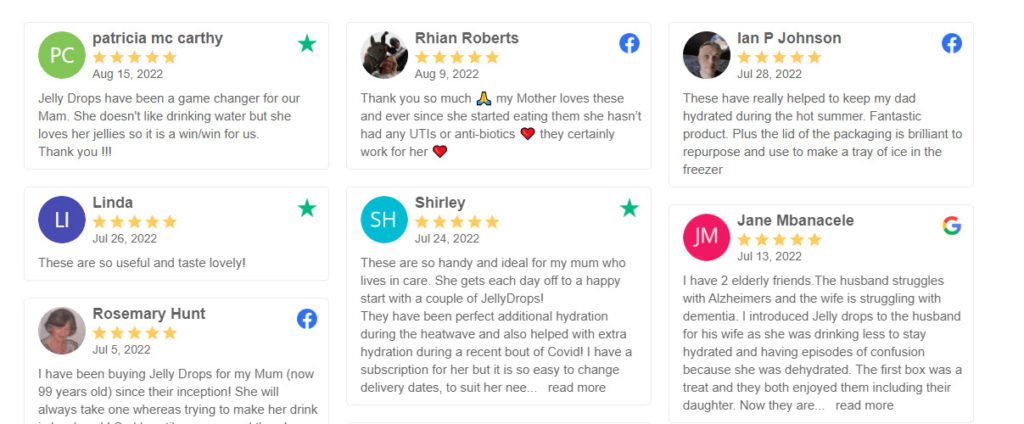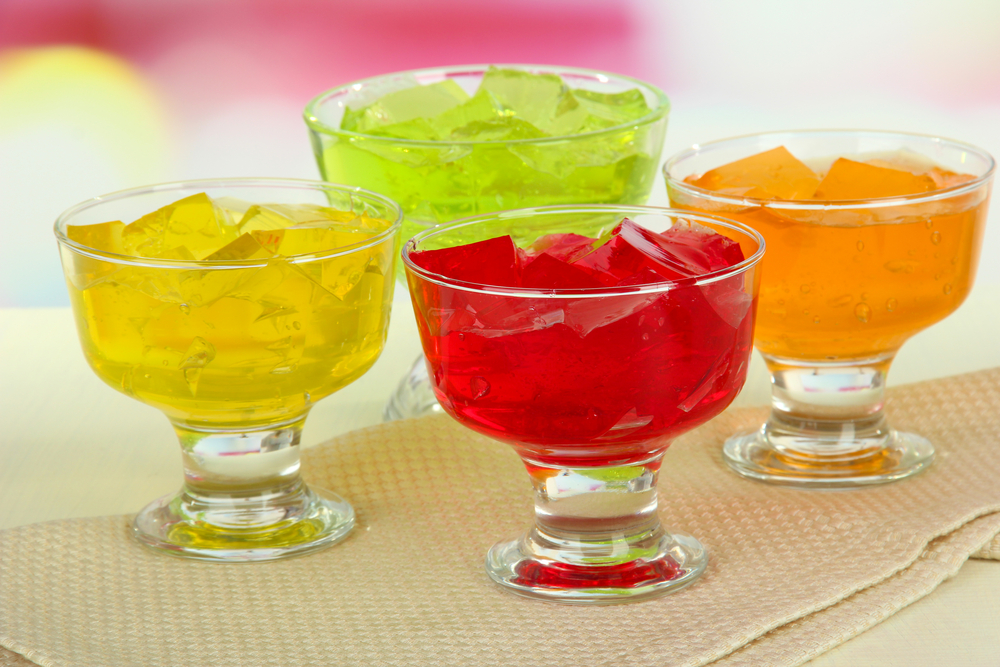Have you heard about dementia water balls? They’re sometimes called dementia hydration balls, water ball jelly drops, or just Jelly Drops.
They’re a clever idea, based on the fact that dementia patients often don’t want to drink water. Sometimes they’re even afraid of it. This can lead to dehydration and increase the risk of many health problems.
There are other ways to help seniors drink more water, including flavoring the water and using small cups. However, these don’t always work for dementia patients, as some develop a fear of water.
What Are Dementia Water Balls?
The famous water balls go by the name Jelly Drops and were developed by a young man called Lewis Hornby. The drops are entirely his invention, based on the idea that most people love sweet things.
So, rather than try to get a loved one to drink water, why not give them a water-based treat instead?
The drops are 95% water, which makes them very hydrating. They’re also sugar free and contain electrolytes – features that make them healthy.
Plus, these aren’t sweets with a liquid center. Such a center could be an issue for dementia patients. Instead, the sweets have a consistent texture all the way through. They really are like candy in many ways.
Reviews for the Water Balls
It’s clear that Hornby is onto a winner, as many people love the drops. They’re surprisingly effective at getting people to consume more water – even when nothing else works.
This really shows up on the company’s Facebook page and on the review part of the website. Both areas are packed with positive reviews.
Every aspect of the design was carefully chosen as well. This includes the box, which helps to make the drops appealing and easy to remember.

Are There Any Issues?
Reviews for the water balls are almost always positive. But, they’re not likely to work for everyone. There are a few serious problems we need to consider.
The Texture
First, some seniors may not enjoy the texture, perhaps finding the balls too watery. After all, candy isn’t normally 95% water.
The balls also rely on natural flavors and are sugar free. This might not be appealing to seniors who love sugary treats and conventional candy. Plus, some people do get side effects from alternative sweeteners.
The Price
The water balls come in a pack of 24. If the senior is very resistant to drinking water, they might have 3 or 4 in the course of the day, perhaps more.
One news report even mentions that Hornby’s mother originally consumed 7 drops in a 10-minute window the first time. That’s more than a quarter of the box!
And, those 7 drops just equate to around a cup of water (or perhaps less). Seniors need much more than this each day to stay healthy.
Needless to say, using the drops could easily get expensive.
And, let’s face it, seniors are often pretty strapped for cash (as are caregivers). Many won’t have the funds to buy water balls regularly.
They’re Heavily Processed
These drops help seniors to be hydrated. There’s no doubt about that.
But, are they the healthiest option? Perhaps not, as they’re heavily processed. While they mostly focus on natural colors and flavors, there are some artificial ingredients too. These mightn’t be good for health, especially for seniors who eat the Jelly Drops regularly.
The drops even use sucralose for sweetness. Sucralose is a controversial artificial sweetener that could lead to problems if overconsumed.
Can You Buy Dementia Water Balls?
If you’re in the UK, you can order through the Jelly Drops site. A tray of 24 drops costs £5.70, while a Snackpot with 5 small drops costs just £0.95 (plus shipping, in both cases).
There’s also a separate page for businesses, who can order the drops in bulk.
If you’re in the US, a tray of the drops costs $9.99 and a pot costs $1.66.
The drops aren’t available elsewhere yet, although you can sign up for their waitlist in the meantime.
Alternatives To Jelly Drops

The price and availability of Jelly Drops means they won’t be a good solution for everyone. They certainly can’t be the senior’s only source of hydration.
So, what do you do instead?
Jello
Jello is a logical alternative to the drops, as it’s also water rich, a treat, and comes in plenty of delicious flavors. It’s also popular.
But, while Jello solves the price problem, it’s not particularly healthy. Most jello products are high in sugar. Those that aren’t use sweeteners like aspartame instead. Jello is also packed with artificial colors and flavors.
Homemade Jello
You can skip jello itself and make a similar product at home, using recipes like this one.
Jello like this often relies on agar agar flakes and fruit juice. This gives you a more natural product that’s sweet, delicious, and vegan-friendly.
You could even rely on lemon juice and stevia to create a natural low sugar product (Adrienne from Whole New Mom has a fantastic recipe for doing so).
Such treats take more work than buying a box of Jelly Drops, but you get a much healthier water-rich snack.
Water Rich Foods
Some foods are naturally rich in water, including melons and cucumber. Watermelon is a particularly good choice, as it tastes like a treat anyway.
Cucumber works well in sandwiches too or even served on its own. Tomatoes and celery are viable as well. You could simply serve a few of these water rich ingredients alongside a meal to help with hydration.
There are also meals like soups and stews. These are often very high in water.
Remember, drinking water isn’t the only way to stay hydrated. Getting liquid in food is just as powerful and is often easier for seniors.
Make Your Own Edible Water Balls
It’s also possible to create edible water balls, using sodium alginate.
This is more of a culinary experiment than anything else. You could potentially flavor the water or the balls themselves to make them more interesting. But, they’re not likely to be as tasty as the Jelly Drops.
While some seniors might enjoy this type of water ball, many others are likely to find them strange (and perhaps unnerving) instead.
The video below shows another interesting approach for making edible water. These aren’t treats designed for seniors, but might be worth a try.
Finally, the size Makezine offers a recipe for tiny gelatin dots. These aren’t incredibly resilient, but could be fun and tasty.
It’s worth checking with the senior’s doctor before making water balls or anything else unusual. Such products could even be dangerous for seniors with swallowing issues.
Flavored Water
Infused water is easily the healthiest option. It’s mostly water, with a little flavor and sweetness from fresh fruit.
You can leave fruit in the water for a few hours, which gives you a fantastic balance of flavors. Serving this in small cups often helps, as small amounts feel less overwhelming to seniors.
Final Thoughts
I love the idea of Jelly Drops as dementia water balls. They could even be powerful in some situations.
However, it’s easy to get overly excited about the water balls. I mean, they don’t contain all that much water, are heavily processed, and aren’t cheap.
They could still be helpful in the right situation, but they won’t solve your loved one’s hydration needs overnight.
Feeling Overwhelmed?
Check out our Caregiving Consulting service for personalized support and guidance.

Leave a Reply